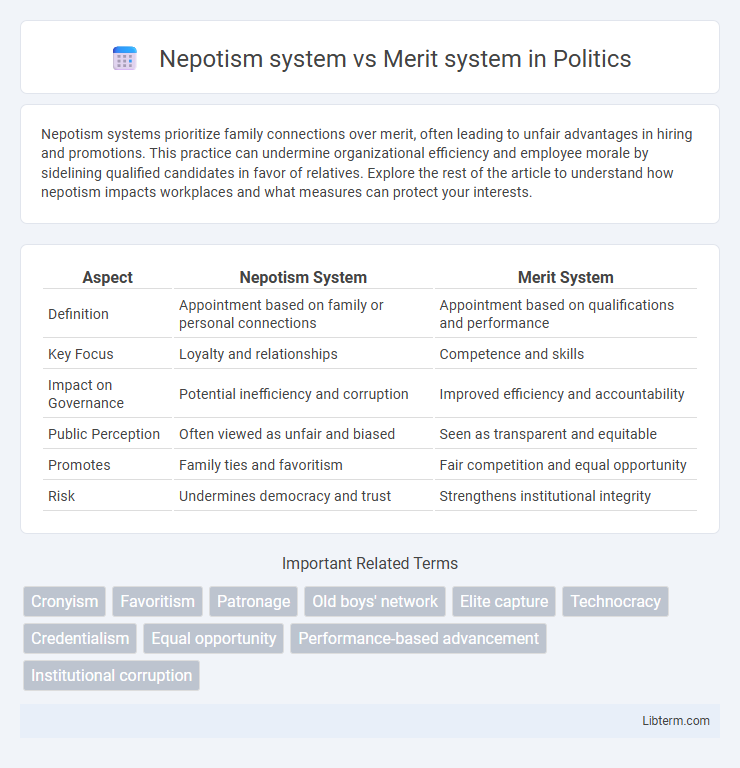Nepotism systems prioritize family connections over merit, often leading to unfair advantages in hiring and promotions. This practice can undermine organizational efficiency and employee morale by sidelining qualified candidates in favor of relatives. Explore the rest of the article to understand how nepotism impacts workplaces and what measures can protect your interests.
Table of Comparison
| Aspect | Nepotism System | Merit System |
|---|---|---|
| Definition | Appointment based on family or personal connections | Appointment based on qualifications and performance |
| Key Focus | Loyalty and relationships | Competence and skills |
| Impact on Governance | Potential inefficiency and corruption | Improved efficiency and accountability |
| Public Perception | Often viewed as unfair and biased | Seen as transparent and equitable |
| Promotes | Family ties and favoritism | Fair competition and equal opportunity |
| Risk | Undermines democracy and trust | Strengthens institutional integrity |
Understanding Nepotism: Definition and Origins
Nepotism refers to favoritism granted to relatives or close friends, especially in employment or professional contexts, undermining meritocratic principles. Originating from the Latin word "nepos," meaning nephew or relative, nepotism historically links to familial privileges in religious and political appointments. This system contrasts sharply with the merit system, which prioritizes skills, qualifications, and performance over personal connections.
What Is the Merit System? Key Principles
The merit system is a method of hiring and promoting employees based on their abilities, qualifications, and performance rather than personal connections or favoritism. Key principles include fairness, transparency, and equal opportunity, ensuring that decisions are made through competitive examinations, evaluations, and objective criteria. This system aims to enhance efficiency, accountability, and professionalism within organizations by rewarding competence and skills.
Comparing Nepotism and Merit: Fundamental Differences
Nepotism system prioritizes family ties and personal relationships over qualifications, often leading to biased hiring and promotions that can hinder organizational performance. Merit system emphasizes skills, experience, and competence as the basis for recruitment and career advancement, promoting fairness and efficiency. The fundamental difference lies in nepotism's reliance on favoritism contrasted with meritocracy's focus on objective evaluation criteria.
The Impact of Nepotism on Organizational Performance
Nepotism in organizational systems often leads to decreased employee morale and reduced productivity, as positions are filled based on personal relationships rather than competence. Research shows that merit-based systems enhance overall organizational performance by promoting skilled and qualified individuals, resulting in higher efficiency and innovation. The prevalence of nepotism can hinder talent retention and obstruct fair career advancement, ultimately weakening competitive advantage.
Advantages of the Merit-Based System
The merit-based system promotes fairness by ensuring that individuals are selected and rewarded based on their skills, qualifications, and performance rather than personal connections. This approach enhances organizational efficiency and productivity by placing the most competent candidates in key positions, fostering innovation and growth. Furthermore, meritocracy encourages a culture of motivation and continuous improvement, leading to higher employee satisfaction and retention.
Common Examples of Nepotism in the Workplace
Common examples of nepotism in the workplace include favoritism in hiring family members regardless of qualifications, biased promotions given to relatives over more qualified employees, and preferential treatment in assigning desirable projects or shifts. These actions undermine the merit system, which prioritizes skills, experience, and performance in recruitment and career advancement. Nepotism often leads to decreased employee morale, reduced productivity, and a less diverse and competent workforce.
How Meritocracy Drives Innovation and Growth
Meritocracy fosters innovation and growth by rewarding individuals based on skill, performance, and creativity rather than personal connections, ensuring the most capable talent leads projects and decision-making. This system encourages continuous learning and adaptation, which drives productivity and competitive advantage in organizations. In contrast, nepotism often stifles innovation by limiting opportunities to a select few, reducing diversity of thought and undermining organizational potential.
Challenges and Criticisms of the Merit System
The merit system faces challenges such as inherent biases in evaluating qualifications, lack of transparency in recruitment processes, and the potential for subjective assessments to undermine fairness. Critics argue the system may overlook contextual factors like diversity and social equity, leading to underrepresentation of marginalized groups. Additionally, rigid adherence to merit criteria can stifle creativity and discourage valuing interpersonal skills or practical experience.
Strategies to Combat Nepotism in Institutions
Implementing transparent recruitment processes and standardized evaluation criteria effectively reduces nepotism by prioritizing candidates' qualifications and performance. Establishing independent oversight committees to monitor hiring and promotions ensures accountability and deters favoritism. Incorporating anonymous application reviews and regular audits of institutional practices further enhances fairness and merit-based advancements.
Building a Fairer Future: Balancing Merit and Relationships
Balancing the merit system and nepotism requires integrating transparent evaluation criteria with acknowledged relational dynamics to build a fairer future. Prioritizing skills, qualifications, and measurable achievements while recognizing the value of trust and long-term relationships fosters inclusive opportunities and organizational loyalty. Transparent merit-based policies combined with ethical handling of personal connections mitigate biases and promote equitable growth in professional environments.
Nepotism system Infographic

 libterm.com
libterm.com